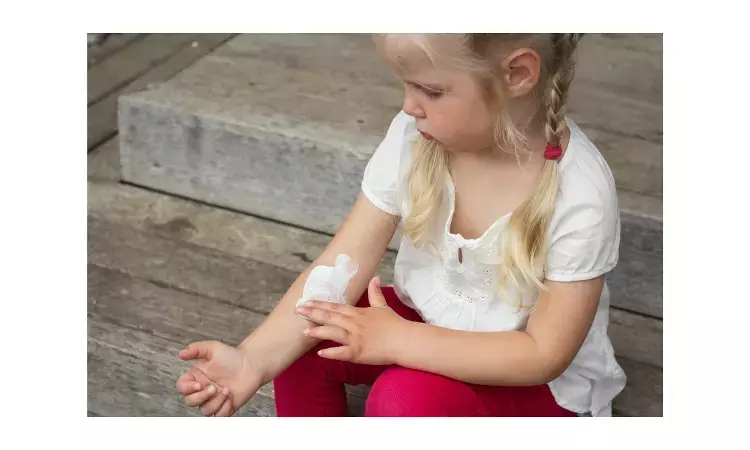- Home
- Medical news & Guidelines
- Anesthesiology
- Cardiology and CTVS
- Critical Care
- Dentistry
- Dermatology
- Diabetes and Endocrinology
- ENT
- Gastroenterology
- Medicine
- Nephrology
- Neurology
- Obstretics-Gynaecology
- Oncology
- Ophthalmology
- Orthopaedics
- Pediatrics-Neonatology
- Psychiatry
- Pulmonology
- Radiology
- Surgery
- Urology
- Laboratory Medicine
- Diet
- Nursing
- Paramedical
- Physiotherapy
- Health news
- Fact Check
- Bone Health Fact Check
- Brain Health Fact Check
- Cancer Related Fact Check
- Child Care Fact Check
- Dental and oral health fact check
- Diabetes and metabolic health fact check
- Diet and Nutrition Fact Check
- Eye and ENT Care Fact Check
- Fitness fact check
- Gut health fact check
- Heart health fact check
- Kidney health fact check
- Medical education fact check
- Men's health fact check
- Respiratory fact check
- Skin and hair care fact check
- Vaccine and Immunization fact check
- Women's health fact check
- AYUSH
- State News
- Andaman and Nicobar Islands
- Andhra Pradesh
- Arunachal Pradesh
- Assam
- Bihar
- Chandigarh
- Chattisgarh
- Dadra and Nagar Haveli
- Daman and Diu
- Delhi
- Goa
- Gujarat
- Haryana
- Himachal Pradesh
- Jammu & Kashmir
- Jharkhand
- Karnataka
- Kerala
- Ladakh
- Lakshadweep
- Madhya Pradesh
- Maharashtra
- Manipur
- Meghalaya
- Mizoram
- Nagaland
- Odisha
- Puducherry
- Punjab
- Rajasthan
- Sikkim
- Tamil Nadu
- Telangana
- Tripura
- Uttar Pradesh
- Uttrakhand
- West Bengal
- Medical Education
- Industry
Nemolizumab plus topical agents effective against atopic dermatitis and pruritus in children: Study

Japan: Nemolizumab 60 mg Q4W given along with topical treatments in atopic dermatitis (AD) patients with inadequately controlled moderate-to-severe pruritus is a promising treatment, shows a recent study.
According to the study published in the British Journal of Dermatology, nemolizumab with concomitant topical treatments in patients with AD and inadequately controlled moderate-to-severe pruritus helped in continuous improvement in signs of AD, pruritus, and quality of life for up to 68 weeks, with a favorable safety profile.
Atopic dermatitis (AD) occurs, between1% to 25% of the population depending on the geography and age range. Nemolizumab is a first-in-class monoclonal antibody directed against the IL-31 receptor alpha that blocks signaling from neuroimmune cytokine IL-31. IL-31 is known to be a central mediator that serves as the bridge between the immune and nervous systems while directly acting on structural cells in the skin.
K. Kabashima, Department of Dermatology, Graduate School of Medicine, Kyoto University, Kyoto, Japan, and colleagues aimed to examine the long-term effectiveness and safety of nemolizumab in patients aged ≥13 years with AD and inadequately controlled moderate-to-severe pruritus.
In two long-term phase III studies, nemolizumab 60 mg every 4 weeks (Q4W) was administered subcutaneously, concomitantly with topical treatments. Study-JP01 patients received double-blind nemolizumab or placebo for 16 weeks, and then entered a 52-week extension period in which all patients received nemolizumab (nemolizumab/nemolizumab and placebo/nemolizumab groups). Study-JP02 patients received nemolizumab for 52 weeks. Both studies included an 8-week follow-up period.
A total of 143, 72, and 88 patients were included in study-JP01 nemolizumab/nemolizumab and placebo/nemolizumab, and Study-JP02 nemolizumab groups.
The results of the study were:
• In the nemolizumab/nemolizumab group, there were clinically meaningful improvements from the start of treatment to week 68 in the pruritus visual analog scale (66% decrease) and eczema area and severity index (78% decrease).
• Quality of life indicators improved after the first nemolizumab dose; improvements were maintained during the follow-up period. The long-term safety profile was consistent with previous studies, with no unexpected late-onset adverse events.
Kabashima and the team concluded that "Nemolizumab 60 mg Q4W with concomitant topical treatments in patients with AD and inadequately controlled moderate-to-severe pruritus produced a continuous improvement in pruritus, signs of AD, and quality of life for up to 68 weeks, with a favorable safety profile."
Reference:
Medical Dialogues consists of a team of passionate medical/scientific writers, led by doctors and healthcare researchers. Our team efforts to bring you updated and timely news about the important happenings of the medical and healthcare sector. Our editorial team can be reached at editorial@medicaldialogues.in.
Dr Kamal Kant Kohli-MBBS, DTCD- a chest specialist with more than 30 years of practice and a flair for writing clinical articles, Dr Kamal Kant Kohli joined Medical Dialogues as a Chief Editor of Medical News. Besides writing articles, as an editor, he proofreads and verifies all the medical content published on Medical Dialogues including those coming from journals, studies,medical conferences,guidelines etc. Email: drkohli@medicaldialogues.in. Contact no. 011-43720751


